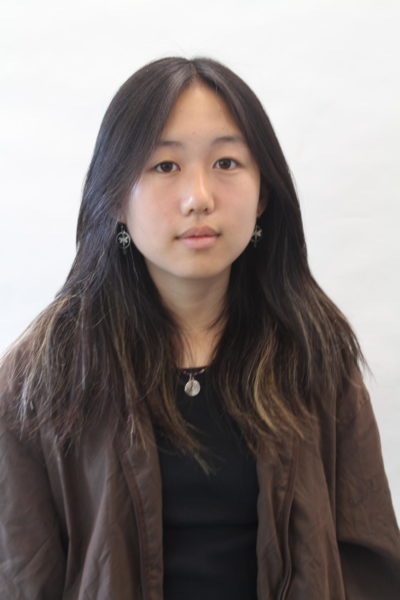
Number of years in The Coat of Arms: 4
Favorite aspect of journalism: Working with other people on staff :)
Interests outside of school: Reading, writing, cooking
Class of 2024
October 19, 2022
While speaking at the assembly, Trondsen accompanied his presentation with images demonstrating how his mental health affected his physical health. Staff photo: Andrea Li
At the Sept. 27 mental health assembly, Vice President of Obsessive Compulsive Disorder Southern California Chris Trondsen spoke about his mental health journey. Mental Health @ Menlo club and the Menlo counselors organized the assembly.
During the assembly, Trondsen spoke about his experience with OCD and body dysmorphic disorder. Through sharing anecdotes of his struggles with mental health, Trondsen aimed to dispel stigma around the topic of mental health. “I first and foremost wanted to educate the attendees about obsessive compulsive disorder and body dysmorphic disorder; these disorders are often misunderstood,” Trondsen said. “I also wanted to normalize the shame and stigma many boys and men face when wanting to seek treatment for body image issues.”
Tronsden also looked to highlight how mental health struggles may present uniquely in different people. “Mental health does not always look the way people predict. I was struggling with OCD and BDD, along with the anxiety, depression, panic attacks and substance use that went with it. However, I […] appeared so happy,” Tronsden said. “Mental health doesn’t mean the person always isolates and cries; we can appear happy and stable.”
Upper School counselor Stefie Dominguez hopes that the assembly emphasized the support available to students struggling with mental health at Menlo. “Having Chris speak on what he went through hopefully helped students to see that […] there are support systems here,” Dominguez said. “Which is why toward the end, […] showing resources was important for us, as well as showing our faces as the school counselors.”
Dominguez highlighted the importance of reaching out for help. “One of the most important things about mental health is actually talking to someone about it and not just keeping it all inside.” Dominguez said. “It’s okay to not be okay sometimes.”
In planning, the counselors had to consider how the assembly would resonate with the student body. According to Upper School counselor Jake Fauver, they began brainstorming at the end of the last school year. “Ideally, we’re trying to think of [assemblies] as four years of hearing stories and experiences. […] That’s what led us to thinking about OCD: [It’s] something that a good number of our students experience and we haven’t talked publicly about,” Upper School counselor Jake Fauver said.
According to Upper School counselor Tracy Bianchi, part of the planning process for the assembly included talking to directors of Mental Health @ Menlo and the student government about topics for assemblies, while also gauging student interest in topics through word of mouth. “We’re trying to cast a wider net. […] We know these [assembly] times are valuable and we want you guys to have a better understanding of how these struggles can be addressed,” Bianchi said.
Dominguez believes that the assembly went over well with students. “I thought Chris did a great job with engaging the students. […] All we want is for people to actually be engaged in this,” Dominguez said. “It actually felt like the students took something away from it, hopefully a message of hope, and that there is help if you need it.”
Trondsen’s message rang true with senior Sydney Schirrmeister. “[Trondsen] did a great job communicating the complexities and dangers of poor mental health, while making the heavy topic feel approachable through his humor,” Schirrmeister said. “I think [Trondsen] made everyone feel that it actually can get better, and […] he’s not just preaching ‘high school is hard and it will get better’ at us.”
